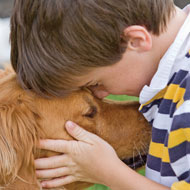
Researchers to explore the combination of immunotherapy and radiation
US researchers are conducting a study into whether a dog’s immune system could be stimulated to eliminate osteosarcoma.
The team at the University of Illinois College of Veterinary Medicine hope their findings could lead to advances in not only treating canine patients but children too.
Study co-investigator and veterinary oncologist Dr Timothy Fan said: “Because there are similarities between canine osteosarcoma and human paediatric osteosarcoma, finding better treatment options for this form of cancer is equally important.”
Osteosarcoma is a highly aggressive, malignant bone tumour that most often occurs in one of the limbs. The disease affects around 10,000 dogs each year in the US, most of which are large or giant breeds.
“The first sign owners typically notice in their pets is lameness,” says Dr Kim Selting who is also working on the study. “Animals may also have swelling in the area of the tumour. These areas can be warm and painful to the touch.”
Current treatment options for canine osteosarcoma are radiation, amputation, chemotherapy or a combination of these methods. The veterinary surgeon works with the owner to design a treatment plan, tailored to the individual, that focuses on quality of life.
In the study, the team will assess a treatment method that combines an immunostimulatory molecule called CPG ODN - a molecule that has already shown promise as a component of cancer vaccines - with high-precision radiation.
The study will take place in three parts, looking first at a cell model, then a mouse model to see how the CPG molecule works in real animals. The findings from these studies will then be used to develop treatments for a small pilot study involving dogs.
“Comparative oncology - the study of cancer treatments in multiple species - has the potential to deliver tremendous medical advances,” Dr Fan continues. “This field is exploding.
“The National Cancer Institute has designated Illinois and 21 other academic oncology programs as part of the Comparative Oncology Trials Consortium, which plays an important role in human cancer research.”



 The latest
The latest